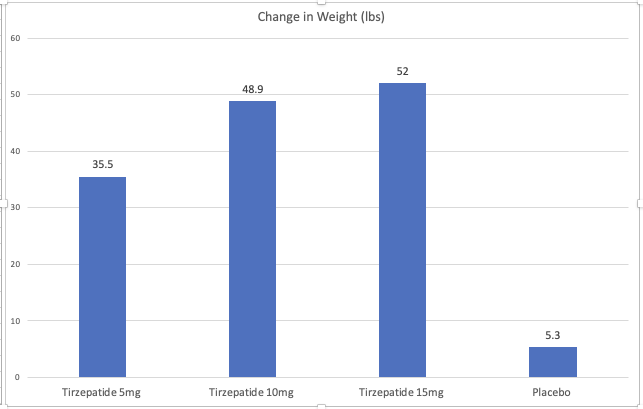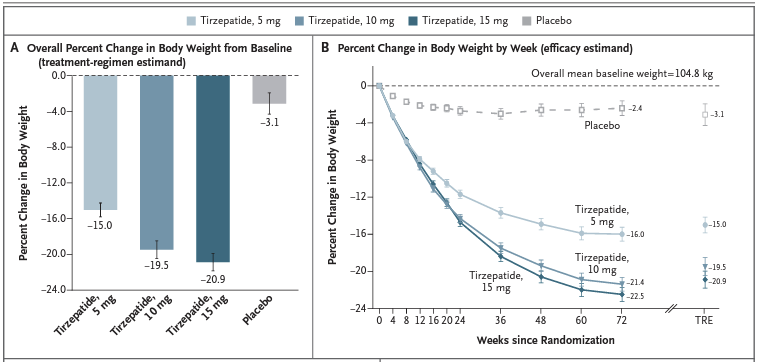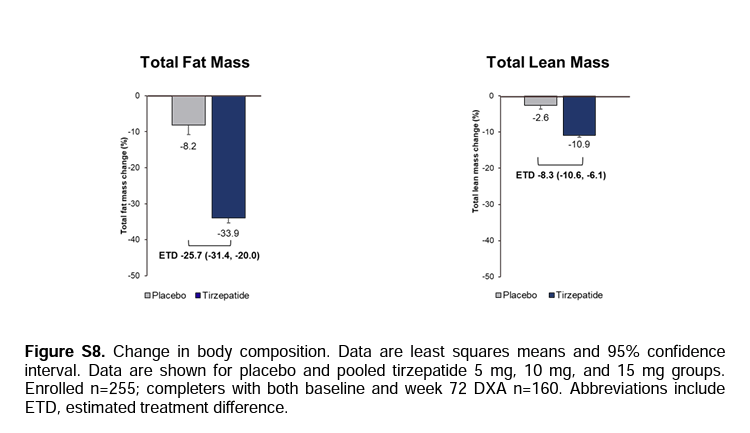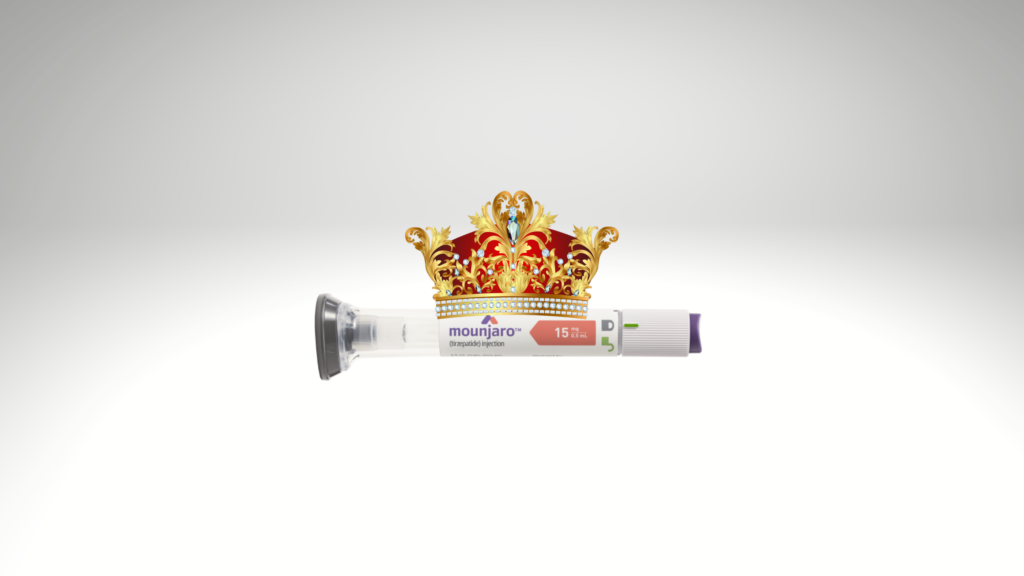The following is a transcript of the “Mounjaro for Weight Loss?? New King of the Hill??” video posted on YouTube.
—
So, Mounjaro.
I haven’t talked about Mounjaro in a while since I previously reviewed what was called the SURPASS-2 trial that actually compared Mounjaro to Ozempic 1 mg once a week in individuals that have diabetes. And from both a blood sugar perspective and a weight loss perspective, there was some pretty remarkable results.
However, today we wanna review just looking at Mounjaro and purely weight loss in individuals that have obesity.
So let’s get into it.
Welcome back to the program, you beautiful people. Before we dive into all things that are Mounjaro or Trizepatide, I gotta remind you to hit that subscribe button down below so that you don’t miss another episode. As well, you probably need to check me out on my other channels @TheOffcialDrDan. You can see me on the Gram, the Tik, the Book, the everything in between. You can see me. As well, check out my website, healthevolved.co, where you can book a consultation with myself if you need some support along your weight management journey.
All right, before we dive into everything, as always, I’d like to do a quick review, like actually talk about what is Mounjaro or Trizepatide, what does it do, how does it work, and so on. So Mounjaro or Trizepatide is similar to semaglutide or Ozempic in that it does have a component that binds to the GLP-1 receptor.
Now, as a quick reminder, GLP-1 is a hormone, a satiety hormone, so it helps us to feel full and gets us to stop eating that is naturally produced by our bodies. But what is different about Mounjaro is that it also has this component called GIP or Glucose-dependent Insulinotropic Peptide.
And basically what that means is that it needs glucose. It’s glucose dependent, so it needs glucose to work or sugar in the bloodstream to have some kind of effect. It’s insulinotropic, so that means it helps to increase or make our bodies more efficient at making insulin. And polypeptide just means it’s a big old protein.
Both GLP-1 and GIP are hormones that are produced by our body. Now, they get produced when food enters into our stomach and those hormones get released from our intestine and then go out and have their various effects throughout various parts of our body.
So first off, GLP-1 basically acts in a number of different areas going to our pancreas and helping our pancreas to produce more insulin. It goes to our stomach and tells our stomach to slow down how quickly food’s going from our stomach to the small intestine. And then finally, in terms of how it helps us to manage our weight is the effects that it has within the brain and decreasing our food-seeking behaviors.
GIP, on the other hand, well, really isn’t all that different. It does a lot of the same things in terms of helping the pancreas, slowing down that gastric emptying aspect of things and working within the reward centers of the brain to decrease our food-seeking behaviors. However, one thing that might be a smidge bit different between GIP and GLP-1 is that GIP might have some kind of preferential effect in terms of affecting our visceral fat, so the fat that’s in between our organs. It might actually somehow reduce the inflammation or have some kind of effect there where it can actually remove that fat specifically.
Now, we actually don’t have any human trials or models that really show that, it’s very much in its preliminary stages, but that is what we have seen within animal models. So some very, very interesting effects potentially, and yeah, TBD. But essentially what happens with this molecule is that having the combination of GLP-1 and the GIP is that they both seem to have this synergistic effect that basically enhances the overall effects that is seen with just the GLP-1 itself. So they seem to have that extra benefit when we combine the two together.
And so to really highlight that point, we’re gonna talk about the SURMOUNT-1 trial.
So for the SURMOUNT-1 trial, it was pretty standard in terms of the randomized controlled trials that we often do with medications. It was randomized, double-blind, placebo-controlled. So basically we had groups of people that were on Trizepatide or Mounjaro and then a group of people that were basically given a pan that had nothing but sugar water in it.
The people that they had in this study, so you can kind of compare whether this might be you or would it be relatable to you, were adults that had obesity and that was defined as having a BMI greater than 30 or a BMI greater than 27, but they had some kind of comorbidity that might have been weight-related such as hypertension, sleep apnea, and such like that.
Now, yes, the BMI is not the end all be all. And yes, there’s a number of different problems with it, but that is the criteria that they used and often many of these drug trials use for determining what is defined as obesity. The other interesting thing with this group of people is that many of them had tried some kind of diet program or exercise program or what have you and ultimately had been unsuccessful in managing their weight.
So in this trial, we had four different groups. We had Trizepatide 5 mg once a week, Trizepatide 10 mg once per week, Trizepatide 15 mg once per week, and then we had the placebo group, so the group that was basically getting the sugar injections. Now, it’s not like everybody just started on that specific dose of Trizepatide or what have you.
Everyone did kind of like a dose titration process where they started at a lower dose and worked their way up just like we would with semaglutide or Ozempic and Wegovy. And then, of course, as with any weight loss trial, there was interventions with regards to exercise and diet.
Exercise, participants were encouraged to at least get 150 minutes of exercise weekly. That is the absolute bare minimum that we recommend. Everybody was counseled and given a 500 calorie per day deficit. So they basically figured out what an individual’s maintenance level of calories were and then told them to eat 500 calories less than that in order to lose weight. And for the total of this trial, individuals were followed for about 72 weeks or about 16.5 months.
All right, so what about the results?
Well, there was 2,300 plus individuals in this trial and I’ll show you the results here on the big screen so you can really see it well. And as you can see, there are some unbelievable results that we’re seeing.

With Trizepatide 5 mg once per week, individuals lost on average about 35.5 pounds from their baseline. Trizepatide 10 mg once per week, the individuals lost 48.9 pounds on average from baseline. And then the Trizepatide 15 mg dose once a week, And then the Trizepatide 15 mg dose once a week, the individuals were losing 50 plus pounds from baseline. And all of this compared to the placebo over the 72-week period, as you can see, the placebo group only lost about 5.3 pounds.
So those are some pretty fricking amazing results. Now, I wanna show you another couple of really cool graphs. There’s a lot of different bars, a lot of different colors and stuff like that that are going on, but really just focus on the top two graphs here kind of shown on the page.

So in the top left-hand corner, graph number A there, it shows the percent change in body weight from baseline. And as you can see, that percentage increased across the board with each of the higher doses of Trizepatide with the individuals that were on the 15 mg dose of Trizepatide losing over 20% of their weight from baseline, 20%.
So if you were to kinda say 20% from baseline, what that basically means is you take your current body weight and you figure out what 20% of your current body weight is and you minus that from your weight. And on average for their participants here, it was 50 plus pounds of weight. And in fact, if we look at the totality of the evidence in this trial, participants were losing on average 22% of their weight from baseline. Like, that is freaking unreal results.
Like, that is results that yeah, we see in like bariatric surgery. Bariatric surgery could be anywhere from 20-35% loss. So suddenly we have this drug that is literally on average as effective as bariatric surgeries.

Now, to quickly look at this graph again and kind of put up here on the screen for you, if you look at the B section, so the B graph, the one that’s on the top right-hand corner, you can see ultimately the weight that is lost over the period of time right out until that 72 weeks. And as you can see, is that even at that 72-week mark, yeah, things were starting to kind of maybe start flattening out a little bit. But even then, the trend of the graph was still in a downward direction.
So even at 72 weeks at the end of this trial, individuals that were on these medications were still losing weight. So it’s very well possible and I’m sure there’s gonna be those longer term trials come out that are gonna show that if we extend that trial even further for individuals that are on these drugs, they’re ultimately going to lose even more weight. So needless to say, that is just unreal, unreal results.
And so for some even more wild results for you, the authors did a little bit of a secondary outcome, looking at the number of individuals that lost more than 25% of their weight from baseline. So they looked at what people lost for one-quarter of their weight. And so the results, they don’t even stop there.
Let’s talk about some more wild results that occurred. And what they did is they looked at individuals as a secondary outcome, the number of people that lost greater than 25% of their weight from baseline. So these people in each of these groups lost more than one-quarter of their weight from that baseline.
So if you’re 200 pounds and you lost one-quarter of your current baseline weight, that would be 50 pounds. With Trizepatide 5 mg once per week, so the lowest dose, 15% of the individuals lost greater than 25% of their weight. With the 10 mg dose, it was 32% of the individuals. And then with the top dose of 15 mg once per week, the individuals were losing, 36% of the individuals lost greater than 25% of their weight at baseline, so over one-third of individuals at that top dose.
And so to give you a little bit of perspective on that, if there was about 30% of the people and each group had about 600 people in it, 30% or over 30% of people would be about 180 people in the groups were losing more than 25% of their weight from baseline. And in comparison, only 1.5% of the individuals in the placebo group were losing more than 25% of their weight from baseline.
So as you can see, and I always like to highlight that is that the placebo group, some people still achieved a huge amount of weight loss without taking the medication. And whether it was the thought that they were on the medication that was helping them so they were literally getting that placebo effect or they just overhauled their entire life and did all kinds of crazy things and stuff like that and lost that 25%, we really don’t know.
But overall, that really shows that yes, it’s still possible to lose a huge amount of weight without these medications, but it is going to be hella hard. And there’s only gonna be a few people that can actually do it. So that’s all the weight loss stuff, that is like the unbelievable aspect and just how much weight was ultimately dropped in pure, yeah, just fat loss that individuals had, but there was also some other obviously very cool results that came out of this.
We saw reductions in waist circumference, we saw reductions in blood pressure, and we saw reductions in lipids or cholesterol levels, all things that are ultimately going to make you healthier.

Now, something that’s kind of come up in a previous video is the discussion about muscle loss and what kind of happens with that. And fortunately, the authors of the study did a little bit of a sub-study. They scanned people with the DEXA scan before and afterwards and what they found is that actually, there was pretty minimal muscle loss that occurred. And the individuals that were losing at the 15 mg of Trizepatide were losing primarily fat or a good portion of fat in comparison to muscle loss.
If you want more details on muscle loss and all that beautiful stuff, check out the link down in the description below where I go over that in detail and kind of address some of the concerns about muscle loss and what occurs with these medications.
In terms of the side effects because that is always equally as important, side effect profile wise, these drugs were generally pretty well tolerated, a lot of very much the same side effects that we expect with Wegovy, semaglutide, and that sort of thing. In previous trials where I’ve reviewed kind of Ozempic comparing to Trizepatide, what we found is that, yeah, Trizepatide in general tends to lead to more side effects or more people experiencing side effects which largely is because the drug is more potent. So yeah, we’re probably gonna get more side effects unfortunately, but it is important that you speak and work with your clinicians and slowly titrate, work up the dose and finding a dose that works for you versus trying to go from zero to 100 overnight.
And in terms of all the ones that people are worried about and always concerned about is the cancers, pancreatitis, and everything in between. To give you some peace of mind, there was no increases in cancers or anything like that. There might have been some slight very minimal increases in terms of pancreatitis and gallstones. I have reviewed all of the above in more detail in previous videos, so check out those links down below. But overall, there was really no major concerns that came out.
So to give you a quick summary here, individuals were losing a heck of a lot of weight in 22% from baseline, which is a huge amount of weight overall. There really wasn’t a huge jump in significant benefit going from 10 to 15 mg. So it really shows that yeah, maybe you don’t need to go up to that top dose to get to the benefits or anything like that. And really we should be dosing and titrating to effect in these individuals. So if someone does really well on 5 mg, that’s okay. They don’t need to go up on a higher dose. We don’t need to push to the maximum dose to get benefits with these medications because they are so powerful.
And finally, to kind of just make sure that comparison is clear, when we have a weight loss of over 20% from baseline with Trizepatide, Wegovy at its top dose only led to about 12-15% weight loss at baseline. So it’s very clear that Mounjaro/Trizepatide is going to definitely take the title away from Wegovy as being the top weight loss drug and medication.
Unfortunately, Trizepatide only has the indication across the globe for diabetes management both here in Canada and in the States and other places around the world. It’s probably gonna get the indication for obesity management in the US by the FDA by the end of 2024 or end of 2023, my apologies. And then Canada will probably get it sometime in 2024.
So that is everything that is Mounjaro and Trizepatide. Hope you got something out of it. As always, of course, share this video if you did and you think someone else would benefit from it. And of course, you beautiful people, don’t forget to hit that subscribe button down below. And of course, check me out on my other channels and my website, healthevolved.co.
And always remember, small tweaks lead to massive peaks.
References:
Jastreboff AM, Aronne LJ, Ahmad NN, Wharton S, Connery L, Alves B, Kiyosue A, Zhang S, Liu B, Bunck MC, Stefanski A; SURMOUNT-1 Investigators. Tirzepatide Once Weekly for the Treatment of Obesity. N Engl J Med. 2022 Jul 21;387(3):205-216. doi: 10.1056/NEJMoa2206038. Epub 2022 Jun 4. PMID: 35658024.
 Dr. Dan
Dr. Dan
Follow me on social media for regular updates – @TheOfficialDrDan
Subscribe to my newsletter for a heads-up on all new content.
Sharing is caring! Here’s the link for social, email, and even text – https://healthevolved.co/Mounjaro-Weight-Loss
If you need some coaching support on your weight management journey, you can book a consultation with me to see if you’d be a good fit for our program.
Questions or comments? Please send them my way on our Contact Us page!






